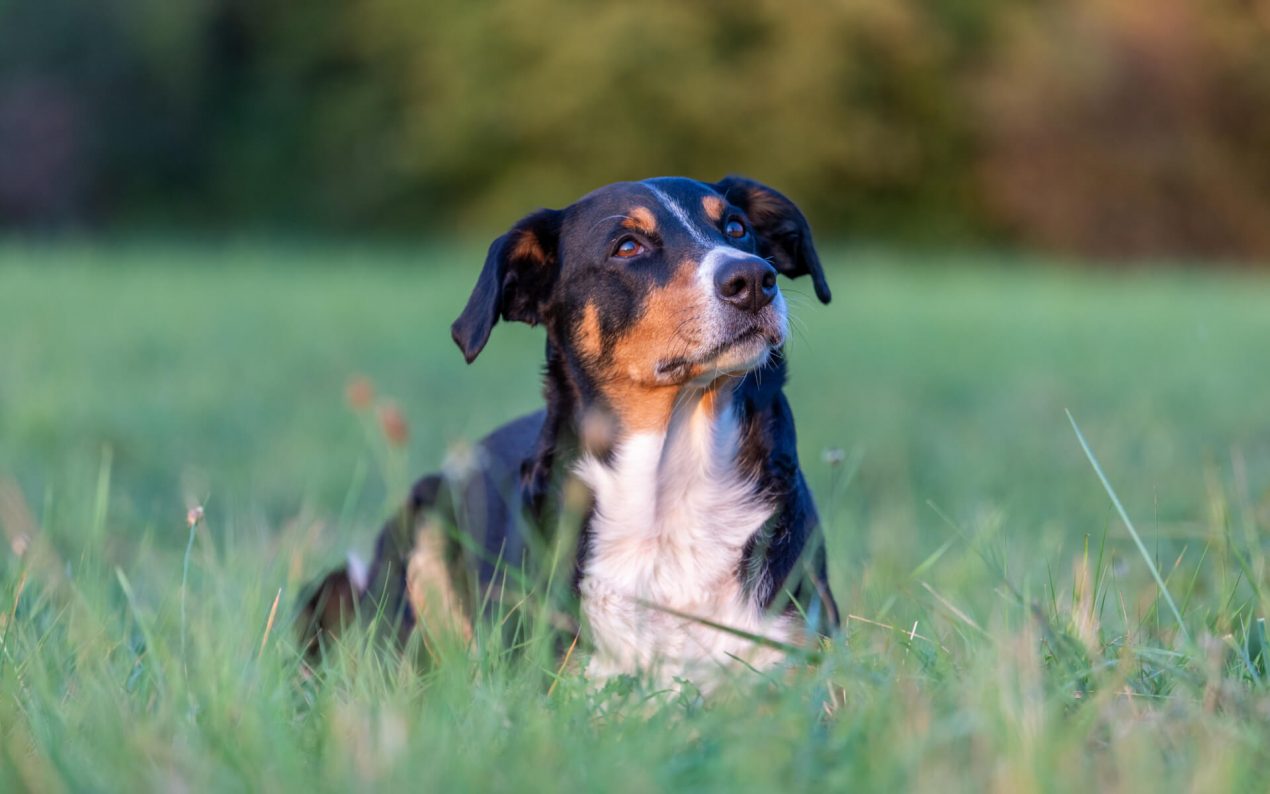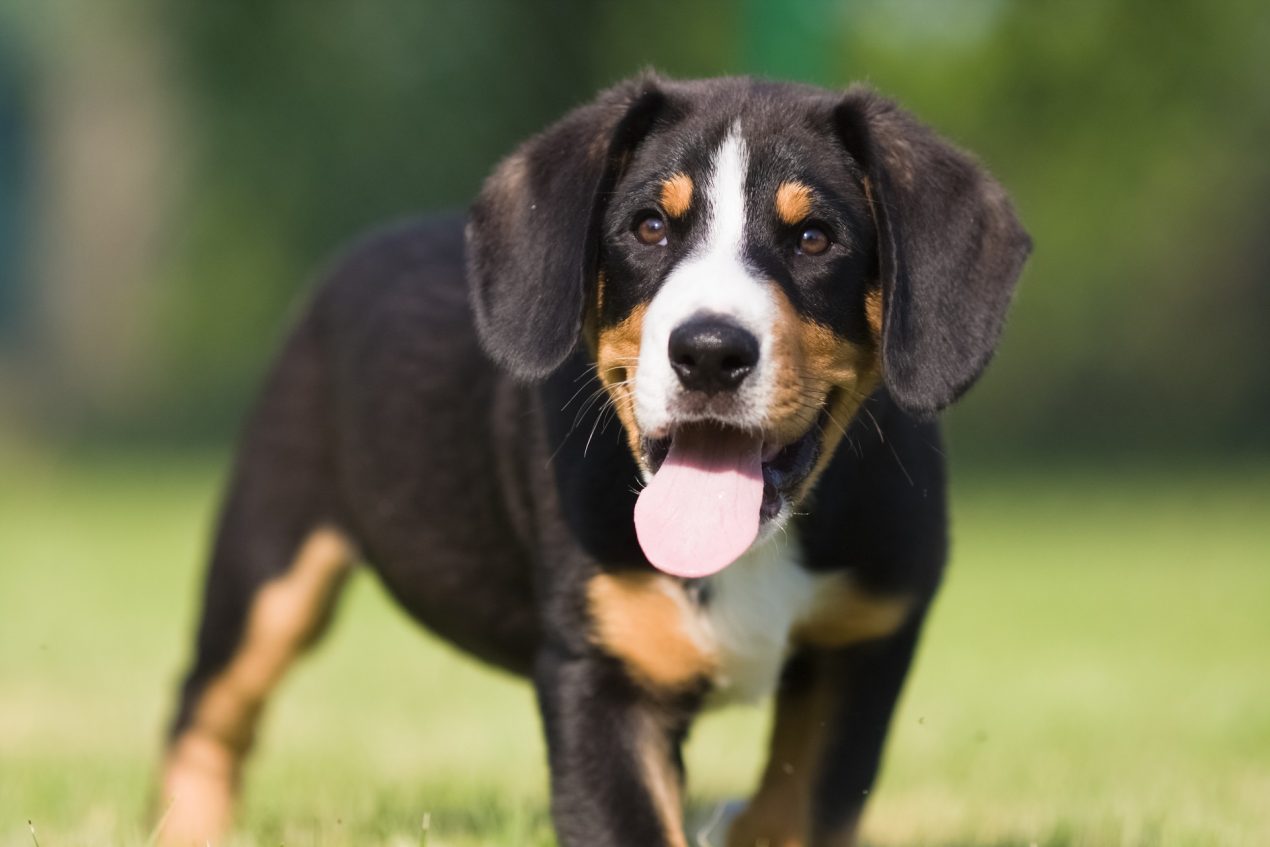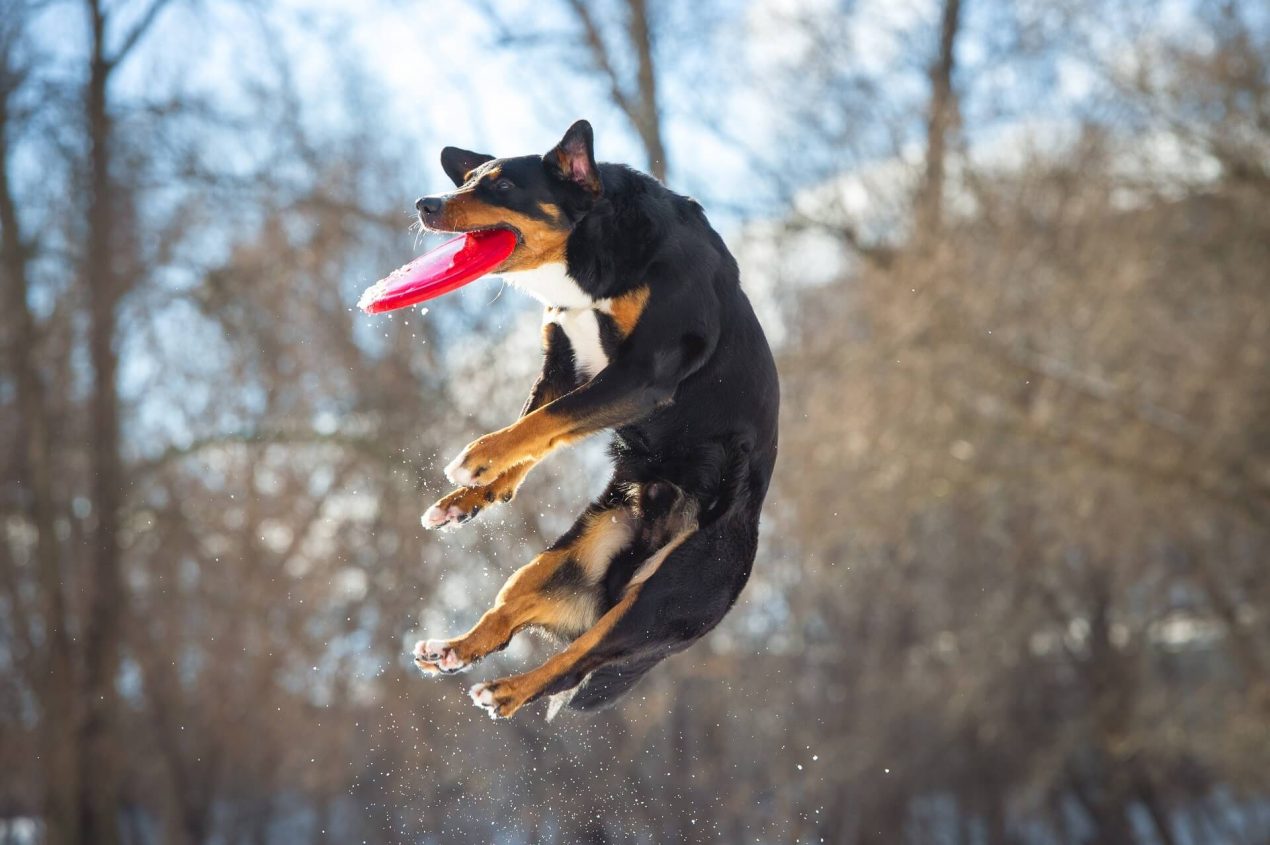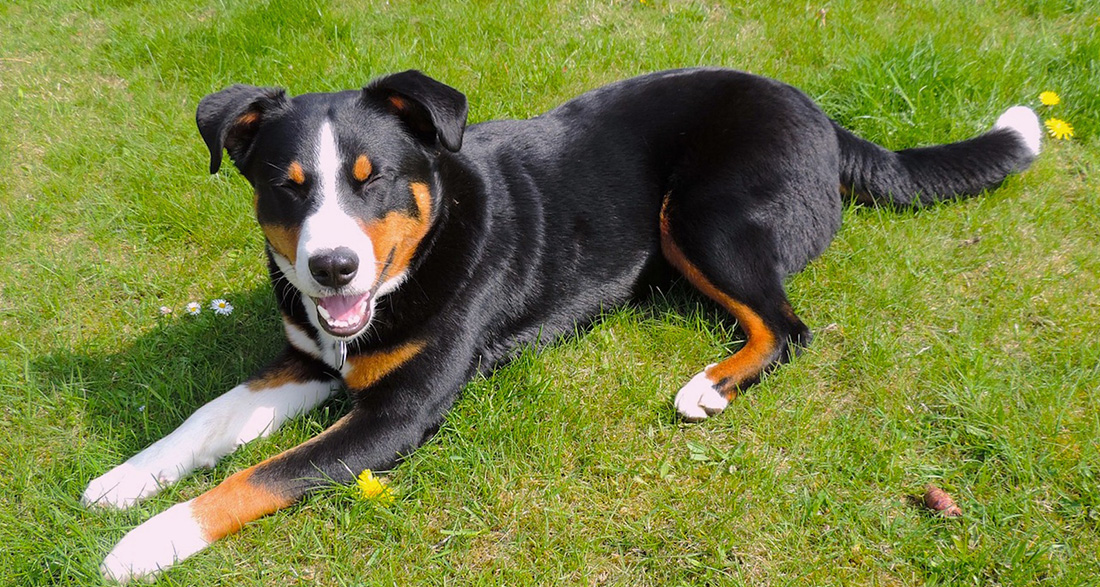The energetic Appenzeller Sennenhund has evolved from its former role as a herding and farm dog to become a beloved family pet throughout its history. Below, you’ll find everything you need to know about the Appenzeller breed.
History of the Appenzeller Sennenhund
As its name suggests, the Appenzeller dog originates from the Appenzell region of Switzerland. There, it was primarily kept by farmers and shepherds as a working dog. It reliably guarded the house and farm while also herding and driving cattle. The Appenzeller likely originated from even further afield. According to one theory, its ancestors could have been Roman war dogs brought into Switzerland during their campaigns across the Alps.
Initially, the esteemed working animal was only bred by farmers. The establishment of a breed was then championed by forester Max Sieber at the end of the 19th century when he introduced breed characteristics for the Appenzeller Sennenhund to the Swiss Kennel Club. Targeted breeding first occurred in 1898 in the Appenzell region on the initiative of the zoologist and geologist Prof. Albert Heim from Zurich. In 1914, Heim defined the first breed standard, and since 1954, the Appenzeller Sennenhund has been a recognized breed by the FCI. It is classified under number 46, in FCI Group 2 “Pinschers and Schnauzers, Molossoids and Swiss Mountain and Cattle Dogs”, Section 3 “Swiss Mountain Dogs”. Its relatives include the “Bernese Mountain Dog” and “Entlebucher Mountain Dog”, which also belong to Section 3.
Breed Overview
GROUP: Herding
HEIGHT: 19 to 22 inches
WEIGHT: 48 to 70 pounds
COAT: Short, smooth double coat
COAT COLOR: Black, brown, and white
LIFE SPAN: 12 to 15 years
TEMPERAMENT: Bright, loyal, lively
HYPOALLERGENIC: No
ORIGIN: Switzerland
Appearance of the Appenzeller Sennenhund
The four-legged companion has a muscular, almost square build. With its size, the Appenzeller Sennenhund belongs to the medium-sized breeds. In terms of color, the Appenzeller resembles its relative, the Bernese Mountain Dog. Its easy-to-care-for, shiny black, sometimes Havana brown, short coat is adorned with symmetrically arranged brown-red and white markings. For example, the tricolored Appenzeller dog has a white chest, blaze, and tail tip, a white collar, muzzle, and white paws. The brown-red can be seen around its almond-shaped, dark eyes, on its legs, and cheeks. Typical of the breed, it carries its densely haired tail curled like a post horn over its back.

Appenzeller Sennenhund Temperament and Character
Appenzeller Sennenhunds had to be quick and enduring as working animals to conscientiously perform their duties as farm and herding dogs. Therefore, these four-legged companions are still powerful bundles of energy today, requiring plenty of exercise and meaningful activities. Due to their character and pronounced ability to learn, Appenzellers are often used as rescue, avalanche search, and guide dogs. Because they are very vigilant, courageous, and fond of barking, they also make excellent, incorruptible guard and protection dogs. The confident, fearless companion is always ready to defend its pack.
The Appenzeller can distinguish between friend and foe. Towards strangers, it behaves rather distrustfully but never aggressively. Furthermore, the intelligent, loyal companion quickly assesses situations, gestures, and facial expressions of humans and reacts swiftly. This makes it an ideal companion for the blind. But families also appreciate its friendly, loyal nature. The Appenzeller Sennenhund is affectionate, cuddly, and happiest when it is part of an active family pack. Children, in particular, benefit from its tireless joy of romping and playing. Similarly, the Appenzeller gets along well with other pets.
| Affection Level | Medium |
| Friendliness | Medium |
| Kid-Friendly | Medium |
| Pet-Friendly | Medium |
| Exercise Needs | High |
| Playfulness | Medium |
| Energy Level | High |
| Trainability | Medium |
| Intelligence | High |
| Tendency to Bark | High |
| Amount of Shedding | Medium |
Acquiring an Appenzeller Sennenhund
Appenzeller Sennenhund Breeding:
The four-legged companion is bred very minimally as a purebred with a very small number of usable breeding animals. Therefore, the Appenzeller is nearly threatened with extinction. In reputable breeding, profit is not the focus, but rather the well-being of the animals. Responsible breeders ensure that only healthy dogs are used for breeding to prevent hereditary diseases from manifesting in the breed. Therefore, parent animals and their puppies undergo thorough medical examinations for breed-specific diseases. In addition, strict breeding guidelines are in place.
Appenzeller Sennenhund Price:
The price for an Appenzeller dog from reputable breeders is between $1,000 and $1,200. This acquisition cost is entirely justified, as breeders incur enormous expenses. These include expenses for food, vaccinations, medical examinations, deworming, microchipping, mating the female, and membership in associations.

What should I look for when buying?
You should only buy from a breeder who is a member of a breeding association. Furthermore, the breeder should allow you to see the puppies with the mother in the environment where they are kept before the purchase. It is important that they are raised lovingly in a clean environment. The breeder should also ask you many questions to ensure that their puppy will find a good new home. If they want to sell you the puppy quickly and cheaply without asking many questions, it’s best to stay away. This does not indicate a reputable breeder.
Appenzeller Sennenhund Shelter:
If you cannot find a purebred Appenzeller dog due to its rarity or do not want to spend as much money, you can also inquire at the shelter to see if they have a similar dog. Every soul in the shelter is grateful to find a new, loving home.
Development and Training of the Puppy
The lively Appenzeller Sennenhund puppies require a loving, patient, consistent education that may not necessarily be suitable for “dog beginners.” It is important to find the right balance between strictness and gentleness. Too harsh training can quickly backfire and produce a stubborn, or, worst-case scenario, an aggressive dog.
Visiting a dog school is advisable for the little Appenzeller, where they can socialize by playing and romping with their peers. They will also learn some obedience there. As the multitasking nature of the Appenzeller is naturally curious and trainable, their education is likely to succeed with proper guidance. Particularly their fondness for barking, distinctive and loud, should be directed into orderly channels early on to prevent it from getting out of hand.
To ensure that the energetic four-legged friend is physically and mentally balanced, the young dog should be happily engaged in dog sports with sufficient exercise at around one year old. Not too early, so as not to overstrain their still-growing bones and joints.
How to Care for an Appenzeller Sennenhund?
The clever, powerful Appenzeller dog is not suitable for couch potatoes. It prefers active owners who spend a lot of time with it and keep it busy to ensure its happiness.
Activities with the Appenzeller Sennenhund:
An Appenzeller is a spirited working animal that needs a lot of exercise and mental stimulation. In addition to long walks or cycling, activities such as dog sports or training, for example as a rescue dog, are also suitable. Suitable dog sports include agility, treibball, or dog carting. In agility, the spirited dog overcomes many obstacles such as hurdles, hoops, seesaws, and tunnels. Treibball offers the Appenzeller balls instead of sheep to “herd.” On a limited playing field, the four-legged friend enthusiastically herds balls into a goal. Dog carting is practiced using a special harness, a rope, and a piece of equipment such as a scooter or bicycle. Active Appenzellers will love this sport.

A house with a garden where the furry friend can romp around “in between” is advantageous. The Appenzeller Sennenhund will gladly engage in sports and exercise in any weather, even in rain, snow, and wind, as it has easy-to-care-for short hair with a dense undercoat.
Health and Care of Appenzeller Sennenhund
The breed is naturally very robust and easy to care for, as it was accustomed to living outdoors with its herd. On average, Appenzeller Sennenhunds live to be 12 to 15 years old. However, like all dog breeds, there are breed-specific health issues. Appenzeller Sennenhunds are prone to hip and elbow dysplasia, cataracts, heart defects, and skin problems.
Responsible for good health, however, is primarily the owner of the Appenzeller Sennenhund. Just by providing a high-quality diet tailored to the dog’s age and activity level, owners can ensure good health. The food should be free of preservatives, sugar, chemical additives, and preferably grain-free. Instead, it should contain sufficient protein, minerals, and vitamins. This prevents allergies, muscle, and joint problems. The feeding amount should be adjusted by the owner according to the dog’s activity level and age to prevent harmful obesity. Furthermore, physical and mental stimulation and lots of love are also responsible for the healthy development of the four-legged friend.
The grooming of the Appenzeller Sennenhund is quite simple. Its short hair is easy to clean and only needs to be brushed about twice a week. Paws, claws, ears, and teeth should be checked regularly. For dental care, it is advisable to give a chew bone or dental sticks every day. This reduces tartar formation and makes the four-legged friend happy in the process.
In Summary
The lively Appenzeller Sennenhund is a very rare breed that is not suitable for lazy people or those who are constantly pressed for time. It needs a lot of activity and loving, consistent training to ensure harmonious coexistence with its owner. Then it is a loyal, grateful soul on four paws that brings a lot of joy – even to families with children.
Appenzeller Sennenhund Overview
Pros
- Highly intelligent and a quick learner
- Few health concerns
- Easily adaptable to new tasks for work or play
Cons
- Can be wary of strangers
- Difficult breed to find
- Needs lots of activity and mental stimulation
Do you have an Appenzeller Sennenhund or are you considering getting one? Tell us in the comments what makes it special in your opinion!


